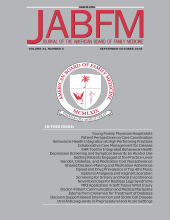To the Editor:
As a Doctor of Nursing Practice working as Nursing Unit Director in a maternal/newborn setting at an academic medical center, I read with great interest Darcy et al's1 recent article “Maternal Depressive Symptomatology: 16-Month Follow-up of Infant and Maternal Health-Related Quality of Life.” The authors should be commended for researching the long-term effects of postpartum mood disorders after new mothers' transition home from the hospital setting. I am impressed this study is a part of the Weaving Work and Family Project: Implications for Mother and Child.2 For nurse clinicians and managers, postpartum mood disorders are a challenging aspect of maternal newborn care. Hillerer et al3 propose that maternal adaptations, such as decreased anxiety and attenuated stress responsiveness, are necessary to enable successful postnatal development of the offspring.
Many devastating consequences of postpartum mood disorder could be avoided with early identification and referral to psychosocial support in the pre- and postnatal settings. There are multiple opportunities for health care providers to monitor and intervene in the prenatal setting when there is evidence of maternal stressors. For example, in the article Darcy et al identify significant depressive symptomatology among African American women aged 18 to 24 years who are impoverished and unwed. Tarantino et al4 establish that the etiology of complex psychiatric disorders result from both genetics and the environment. No definitive environmental factor has been implicated, but studies suggest that deficits in maternal bonding many be an important contributing factor in the development of anxiety and depression. It is possible that neither race nor socioeconomic statuses are factors in assessing or predicting postpartum mood disorders.
Another aspect discussed in the article is an increase in newborn diarrhea and frequent visits to the pediatrician. Talge et al5 determined that maternal and antenatal stress is associated with adverse neurobehavioral outcomes in off spring. including both social/emotional and cognitive functioning during childhood and later in life. I recommend that we inform prenatal patients about work and life stressors and how to address them. Some of the most tragic stories in the media pertain to postpartum mood disorders undetected in the pre- and postnatal settings and the outcome of infanticide. Further research is needed to determine if observed research is causal. Such research is beneficial if more interdisciplinary teams study this problem. Regardless of the mother's ethnicity, the prenatal setting is key to the prevention of negative outcomes of postpartum mood disorders in the community, and it is an opportune setting in which to provide counseling and education to assist childbearing women in making informed choices about postpartum mood disorders once the diagnosis is known. Using best practices to support childbearing families is a high priority. Darcy et al1 are commended for the longitudinal study on postpartum mood disorders and the quality of life for both mother and baby.
Notes
The authors of the original manuscript declined to respond to this letter.







